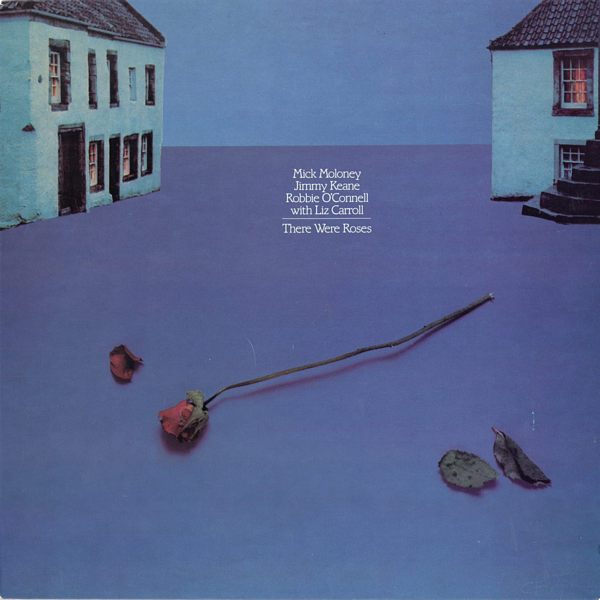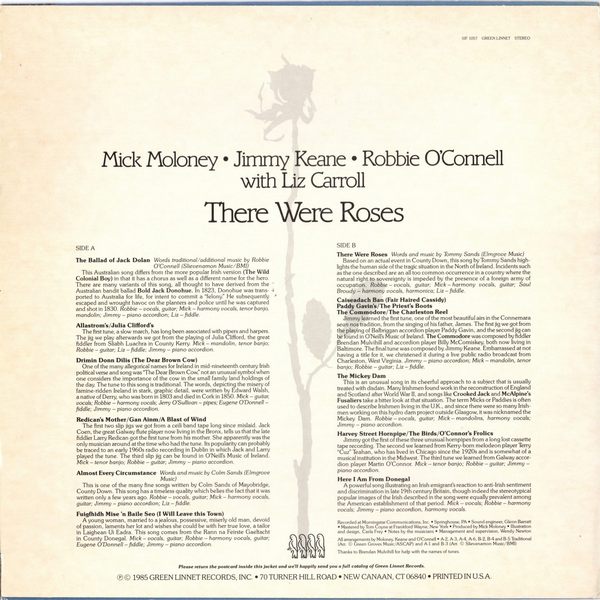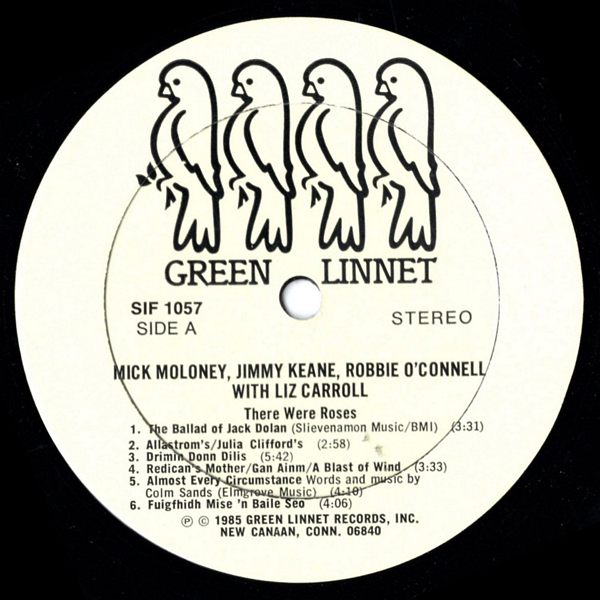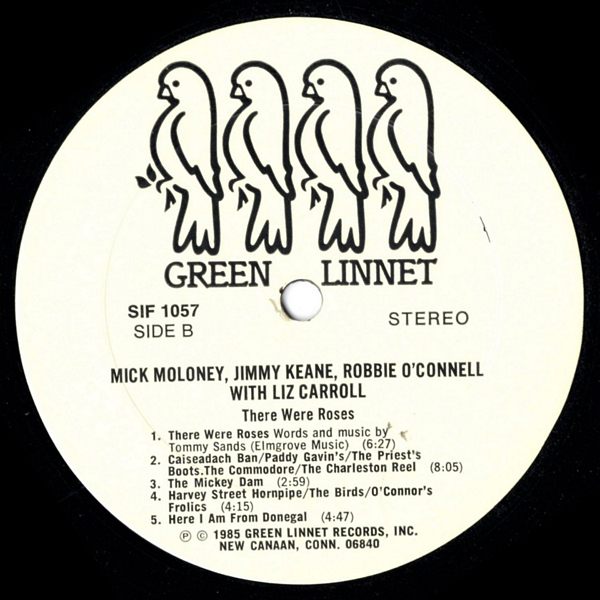
 |


 |
Sleeve Notes
The Ballad of Jack Dolan — This Australian song differs from the more popular Irish version (The Wild Colonial Boy) in that it has a chorus as well as a different name for the hero. There are many variants of this song, all thought to have derived from the Australian bandit ballad Bold Jack Donohue. In 1823, Donohue was transported to Australia for life, for intent to commit a "felony." He subsequently escaped and wrought havoc on the planters and police until he was captured and shot in 1830.
Robbie: vocals, guitar; Mick: harmony vocals, tenor banjo, mandolin; Jimmy: piano accordion; Liz: fiddle.
Allastrom's/Julia Clifford's — The first tune, a slow march, has long been associated with pipers and harpers. The jig we play afterwards we got from the playing of Julia Clifford, the great fiddler from Sliabh Luachra in County Kerry.
Mick: mandolin, tenor banjo; Robbie: guitar; Liz: fiddle; Jimmy: piano accordion.
Drimin Donn Dilis (The Dear Brown Cow) — One of the many allegorical names for Ireland in mid-nineteenth century Irish political verse and song was "The Dear Brown Cow," not an unusual symbol when one considers the importance of the cow in the small family land holdings of the day. The tune to this song is traditional. The words, depicting the misery of famine-ridden Ireland in stark, graphic detail, were written by Edward Walsh, a native of Derry, who was born in 1803 and died in Cork in 1850.
Mick: guitar, vocals; Robbie: harmony vocals; Jerry O'Sullivan: pipes; Eugene O'Donnell: fiddle; Jimmy: piano accordion.
Redican's Mother/Can Ainm/A Blast of Wind — The first two slip jigs we got from a ceili band tape long since mislaid. Jack Coen, the great Galway flute player now living in the Bronx, tells us that the late fiddler Larry Redican got the first tune from his mother. She apparently was the only musician around at the time who had the tune. Its popularity can probably be traced to an early 1960s radio recording in Dublin in which Jack and Larry played the tune. The third slip jig can be found in O'Neill's Music of Ireland.
Mick: tenor banjo; Robbie: guitar; Jimmy: piano accordion.
Almost Every Circumstance — This is one of the many fine songs written by Colm Sands of Mayobridge, County Down. This song has a timeless quality which belies the fact that it was written only a few years ago.
Robbie: vocals, guitar; Mick: harmony vocals, guitar; Jimmy: piano accordion; Liz: fiddle.
Fuigfhidh Mise 'n Baile Seo (I Will Leave this Town) — A young woman, married to a jealous, possessive, miserly old man. devoid of passion, laments her lot and wishes she could be with her true love, a tailor in Laighean Ui Eadra. This song comes from the Rann na Feirste Gaeltacht in County Donegal
Mick: vocals, guitar; Robbie: harmony vocals, guitar; Eugene O'Donnell: fiddle; Jimmy: piano accordion.
There Were Roses — Based on an actual event in County Down, this song by Tommy Sands highlights the human side of the tragic situation in the North of Ireland. Incidents such as the one described are an all too common occurrence in a country where the natural right to sovereignty is impeded by the presence of a foreign army of occupation.
Robbie: vocals, guitar; Mick: harmony vocals, guitar; Saul Broudy: harmony vocals, harmonica; Liz: fiddle.
Caiseadach Ban (Fair Haired Cassidy) Paddy Gavin's/The Priest's Boots The Commodore/The Charleston Reel — Jimmy learned the first tune, one of the most beautiful airs in the Connemara Sean-nós tradition, from the singing of his father, James. The first jig we got from the playing of Balbriggan accordion player Paddy Gavin, and the second jig can be found in O'Neills Music of Ireland. The Commodore was composed by fiddler Brendan Mulvihill and accordion player Billy McComiskey, both now living in Baltimore. The final tune was composed by Jimmy Keane. Embarrassed at not having a title for it, we christened it during a live public radio broadcast from Charleston, West Virginia.
Jimmy: piano accordion; Mick: mandolin, tenor banjo; Robbie: guitar; Liz: fiddle.
The Mickey Dam — This is an unusual song in its cheerful approach to a subject that is usually treated with disdain. Many Irishmen found work in the reconstruction of England and Scotland after World War II, and songs like Crooked Jack and McAlpine's Fusaliers take a bitter look at that situation. The term Micks or Paddies is often used to describe Irishmen living in the U.K., and since there were so many Irishmen working on this hydro dam project outside Glasgow, it was nicknamed the Mickey Dam.
Robbie: vocals, guitar; Mick: mandolins, harmony vocals; Jimmy: piano accordion.
Harvey Street Hornpipe/The Birds/O'Connor's Frolics — Jimmy got the first of these three unusual hornpipes from a long lost cassette tape recording. The second we learned from Kerry-born melodeon player Terry "Cuz" Teahan, who has lived in Chicago since the 1920s and is somewhat of a musical institution in the Midwest. The third tune we learned from Galway accordion player Máirtín O Connor.
Mick: tenor banjo; Robbie: guitar; Jimmy: piano accordion.
Here I Am From Donegal — A powerful song illustrating an Irish emigrant's reaction to anti-Irish sentiment and discrimination in late 19th century Britain, though indeed the stereotypical popular images of the Irish described in the song were equally prevalent among the American establishment of that period.
Mick: vocals; Robbie: harmony vocals; Jimmy: piano accordion, harmony vocals.